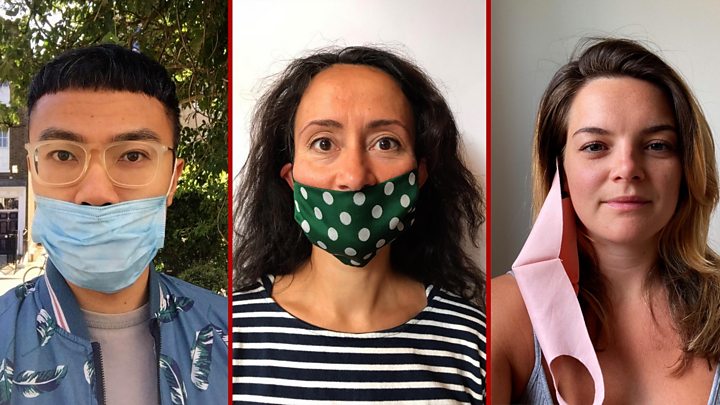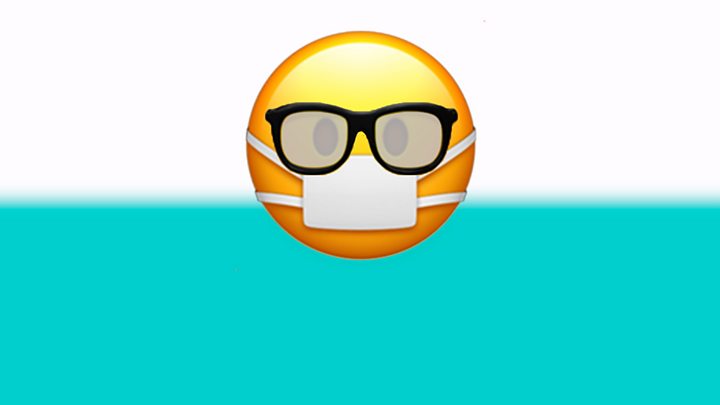
Media playback is unsupported on your device
People around the UK must now wear face coverings in many public places.
But what protection do they offer, and what sort of coverings can be worn?
Why should we wear a face covering?
Face coverings reduce the spread of coronavirus droplets from coughs, sneezes and speaking.
They should mainly be worn to protect other people from coronavirus, rather than yourself.
When worn correctly, they should cover the nose and mouth, which are the main confirmed sources of transmission.
They can help to reduce the spread of the virus from people who are contagious, including those who have no symptoms, or are yet to develop them.
There is also evidence they can offer some protection to the wearer, although they are not a replacement for social distancing and hand-washing.
Where must they be worn in the UK?
Face coverings are now compulsory across the UK when:
- Travelling on public transport
- In shops, supermarkets and shopping centres
- Not seated at a table to eat or drink in hospitality venues
People can be refused travel for not following the rules or fined as a last resort. In England, the police can issue a £200 fine to someone breaking the face covering rules. In Scotland, Northern Ireland and Wales, a £60 fine can be imposed. Repeat offenders face bigger fines.
In England and Scotland, face coverings are also compulsory in a number of indoor spaces, including:
- Banks, building societies and post offices
- Places of worship
- Museums, galleries and entertainment venues
- Libraries and public reading rooms
Face coverings do not have to be worn in some settings where it would be ”impractical” – for instance when dining in restaurants or exercising in a gym.
But on 7 October, Scotland’s First Minister Nicola Sturgeon said she would legislate to extend the mandatory use of face coverings in indoor settings such as staff canteens and corridors in workplaces.
In Wales, face coverings must be worn in all indoor public places by customers and staff.
In Northern Ireland, they must be worn in “any other indoor place where goods or services are available to buy or rent”.
Does everyone have to wear one?
Some people do not have to wear a face covering. They include:
- Children (under 11 in England or Wales, under 13 in Northern Ireland, under five in Scotland)
- Those unable to put on or wear a face covering because of a physical or mental illness or disability
- People for whom wearing or removing a face covering will cause severe distress
- Anyone assisting someone who relies on lip reading to communicate
You can remove your mask if:
- You need to eat, drink, or take medication
- A police officer or other official asks you to, or for shop staff to verify your age
- You are entering a shop to avoid harm, if you do not have a mask on you
Young children should not wear face masks because of the risk of choking and suffocation.
What are the face-covering rules in schools?
The government does not recommend wearing face coverings in educational settings because of the controls that are already in place.
However, each nation is adopting different rules:
- In England, secondary schools will have the ”discretion” to require face coverings in communal areas, where social distancing is not possible
- The Scottish government says all pupils aged over 12 should wear face coverings in corridors and communal areas, but not in classrooms
- In Wales, face coverings are recommended in high schools when social distancing is “unlikely to be maintained”, but are not compulsory
- In Northern Ireland, face coverings must be worn in the corridors of post-primary schools
However, they will be mandatory for schools in parts of England that are under local restrictions, but not in classrooms.

Media playback is unsupported on your device
Can I make one myself?
The BBC has created a guide on how to make your own face covering.
The government has issued its own advice too.
Do face coverings work?
Face coverings do not give the wearer as much protection as the masks that healthcare workers wear.
World Health Organization (WHO) advice says non-medical face coverings should be worn in public where social distancing is not possible.
They help us protect each other and reduce the spread from people who are contagious but have no symptoms, or are yet to develop symptoms.
